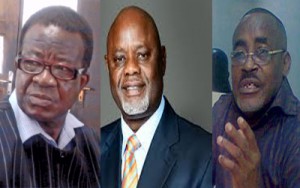
It’s over a year since President Mohammadu Buhari’s administration began and maritime industry is one with lofty ambitions and potentials, but requires several changes in policies as well as a shift in the paradigm as the nation looks towards maritime sector as a substitute to the ailing crude oil.
Nigeria’s maritime industry has suffered poor policy implementation, inconsistent administrators, lack of skilled manpower, corruption, among other factors; these have resulted to failure in actualizing the enormous potentials available in the nation’s maritime sector.

There are several reasons to be worried about the status quo in the nation’s maritime sphere. Port roads have become synonymous to gridlocks, when trucks and tankers are not falling on vehicles, they are cloaking the roads, where is the rail system? The issue of national carrier either via air or sea still lingers? Why does the cost of importing into the nation continue to rise? Nigerian cargoes are now conveniently routed through ports neighbouring countries rather than Nigerian ports.
MMS Plus spoke to some stakeholders in the industry to get their appraisal of the sector and the way forward.

The President of Ship Owners Association of Nigeria (SOAN) Engr. Greg Ogbeifun, lamented that the issue of forex had become a major challenge to ship owners in recent times.

Narrating the ordeal occasioned by the devalued naira, Engr. Greg said, “ship owners have contracts with the International Oil Companies (IOCs) and the IOCS pay us 60% in dollars and 40% in naria. For the naira payment we are given, we change at the Central Bank of Nigeria’s (CBN) rate of N 197 to a dollar. Most of us have bought ships with dollar obligations (dollar financing) but when we want to use the naira that has been paid to us by the IOCs, we have to covert to dollars to be able to meet our dollar obligations only to find that we are changing about N 320 to a dollar, thus we are losing a lot of money. That is how the dollar is affecting us”
Since the IOCs have maintained a nonchalant attitude by refusing to pay fully in dollars, Engr. Greg urged the Buhari the government to authorize IOCs to pay ship owners 100% in dollars because the government sells its crude in dollars.
Meanwhile, Chief Chris Orode, a former Director at the Nigerian Shippers Council (NSC) stated that he was hopeful that the decisions and resolutions bothering on the maritime sector that have been made will be implemented.
This year we have held several maritime conferences but the problem is that the resolutions from the conferences are rarely implemented and when they are, they are never totally implemented. At the end of the day, we go back to the same point we started from.
On the issue of gridlock on the port access roads, Chief Orode asserted that there was a need to provide a Holding Bay or a Truck Park and also an Electronic Call-Up System.
“The government does not need to put funds to execute this project, but give the political support. The Company running this platform is FT Logistics and I’m the chairman. We have made several presentations to all key stakeholders in the industry, including the Lagos state Government and the federal Ministry of Transportation.
“The Terminal Operators, freight forwarders, trucking associations, even the drivers are ready for the initiative. The question is when is it going to start? That has been the rhetorical question. Everybody wants change but we cannot start anything without the landlord giving us the go ahead to introduce the call-up system which will regulate the traffic system to ensure seamless operations while doing business at the ports.” He said.
However, Engr. Olu Akinsoji, the pioneer Rector of Maritime Academy of Nigeria (MAN) Oron called for the establishment of a National Seafarers’ Training Standing Committee (NSTSC). This committee would ensure that the gap in the seafarer training system is eliminated. He noted that that this training system is the linkage between the industry, the institutions and the authority.
He also advised the federal government to explore the means of engaging ship owners operating in Nigeria and ships/ company on regular trade with Nigeria to cooperate with the nation on placement of Nigerian cadets on their ships even if it is at a cost to the cadet or the nation.
Engr. Akinsoji also admonished the Nigerian Maritime Administration and Safety Agency (NIMASA) to publish the criteria for the accreditation of courses relating to seafarer training. He also implored all accredited training institutions to publish the course outlines on every course on offer for which they were accredited.
Nigerians expect to see the developments from the change mantra that President Buhari symbolizes in the maritime industry, hence the government should start early in their bids to resolve these worrisome maritime issues and make the industry a better place.
By Kenneth Jukpor
 MMS PLUS NG – Maritime, Aviation, Business, Oil and Gas News Online Newspaper with coverage in Maritime, Oil and Gas, Aviation, Power and Energy as well as Financial News
MMS PLUS NG – Maritime, Aviation, Business, Oil and Gas News Online Newspaper with coverage in Maritime, Oil and Gas, Aviation, Power and Energy as well as Financial News









